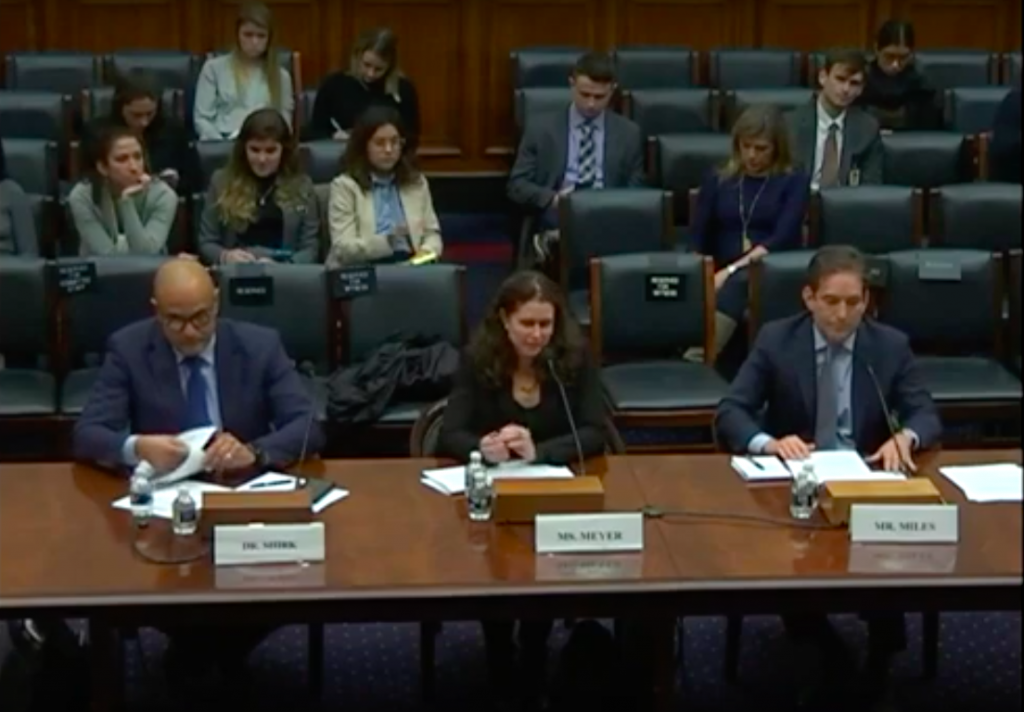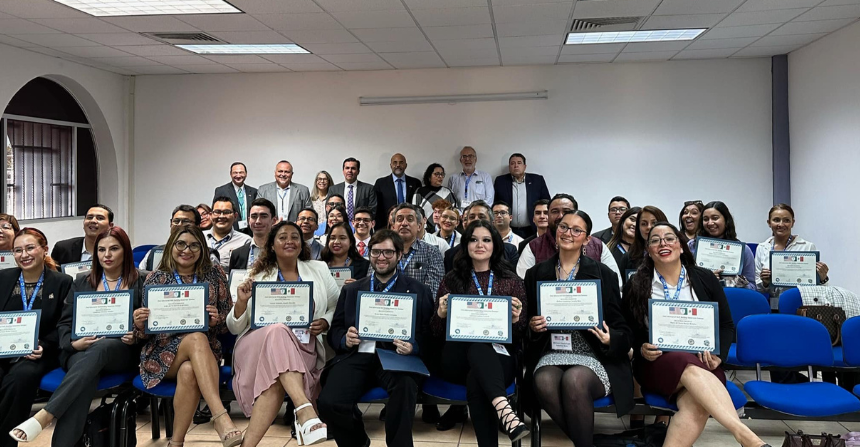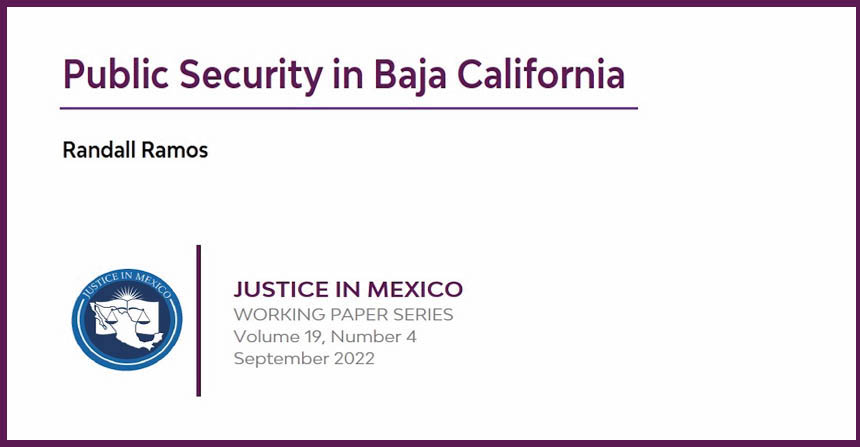
01/27/20 (written by kheinle) — Justice in Mexico Director Dr. David Shirk recently provided expert testimony on Capitol Hill. On January 15, 2020, the Subcommittee on Western Hemisphere, Civilian Security, and Trade, which falls under the House of Representative’s Committee on Foreign Affairs, held a hearing on “Strengthening Security and the Rule of Law in Mexico.” Dr. Shirk spoke alongside two other distinguished experts in the field, Maureen Meyer with the Washington Office on Latina America and Richard Miles with the Center for Strategic & International Studies. The written remarks submitted for the hearing can be found on the U.S. House of Representatives’ Committee Repository site.
The Resurgence of Violence
Dr. Shirk’s presentation looked specifically at the public security in Mexico. He began by contextualizing today’s historic levels of violence, which have been on the rise the past decade despite a brief lull from 2012 to 2014. While final figures are still being tabulated by the Mexican government’s National Public Security System (Sistema Nacional de Seguridad Pública, SNSP), the number of homicide cases reported for 2019 increased to a record of more than 34,000 victims, up from the previous peaks of 33,341 victims in 2018 and the 28,734 in 2017.
There have also been several high-profile displays of extreme violence this past year, noted Dr. Shirk, including the November 4, 2019 killing of nine women and children with dual U.S.-Mexican citizenship in two ambush attacks by an organized crime group in Northern Mexico. The botched catch and eventual release of Ovidio Guzman, son of notorious Sinaloa Cartel kingpin Joaquín “El Chapo” Guzmán, in October in Culiacán was also highlighted, which showcased the serious levels of corruption ingrained in Mexico. Thirteen individuals were also killed during that incident. Read more about the record-breaking levels of violence in 2019 here.
Contributing Factors
The presentation then turned to outlining several systemic factors that contribute to this violence. Dr. Shirk first noted the impact of market shifts and innovations in the production of illicit drugs. Changes in the market for illicit psychotropic drugs (including the proliferation of synthetic drugs, like methamphetamine and fentanyl), have led to a restructuring of Mexican drug production and trafficking networks, resulting in newfound competition and violence.
Second, he pointed to the unintended consequences of counter-drug measures. The policy targeting high level leaders for arrest, known as the “kingpin strategy,” has long been questioned by security experts. It often fails to dismantle the mid-level organizational structures and ancillary support that allow organized crime groups to thrive in Mexico. This leads to newfound competition and violence.
Third, one must consider the changing strategic dynamics among organized crime groups, he said. The last few years have seen greater competition, splintering, and diversification among Mexico’s organized crime groups seeking profitability through extortion, kidnapping, robbery (including fuel theft), and local drug dealing.
Finally, Dr. Shirk called attention to the impact of the changes in Mexican government and policy, which has had disruptive effects on existing organized crime and corruption networks, thus leading to greater violence. He specifically highlighted President Andrés Manuel López Obrador’s election in December 2018, as well as the unprecedented number of Mexican federal, state, and local offices that also turned over that year. In addition, the president had promised a new, more benevolent approach than his predecessor’s militarized security strategy, dubbing his plan “hugs, not gunfights” (“abrazos, no balazos”). With President López Obrador’s first full year in office as the most violent on record, the effectiveness of the government’s security strategy has certainly been called into question.
Dr. Shirk concluded his testimony with ten key recommendations for U.S. authorities:
- Promote better monitoring and analysis of Mexico’s rule of law challenges;
- Assist Mexico in enhancing police and prosecutorial agencies;
- Aid Mexico’s fight against corruption;
- Strengthen controls to prevent illegal exports of firearms to Mexico;
- Establish better controls on money laundering and DTO financial operations;
- Strengthen cross-border cooperation and liaison mechanisms;
- Prevent blowback from U.S. deportations of criminal aliens;
- Allow Mexico to focus its scarce law enforcement resources on domestic security;
- Develop explicit performance measures for the fight against organized crime; and
- Evaluate alternatives to current counter-drug policy.
Other Observations and Recommendations
Maureen Meyer, WOLA’s Director for Mexico and Migrant Rights, also shared her expertise testimony on security and rule of law in Mexico. Her presentation focused more on justice in Mexico, specifically looking at the country’s “weak rule of law.” She covered topics including human rights violations, the National Guard, criminal justice reforms, the autonomy of justice institutions, government collusion, and the role of U.S. engagement in Mexico.
Richard Miles, the Senior Associate of the Center for Strategic & International Studies’ Americas Program, spoke about the 2008 Merida Initiative – the shared agreement between the United States and Mexico that seeks to decrease violence and curtail drug trafficking and organized crime in Mexico. Although the Merida Initiative has failed to reach its goal, he argued, it has certainly improved bilateral security cooperation. This in turn has led to further commitments from the U.S. government to continue supporting Mexico’s security and stability – commitments that he recommended need to be dutifully “tracked and measured.”
Conclusion
The three expert testimony witnesses approached the question of strengthening security and rule of law in Mexico from their own lens: Dr. Shirk emphasizing patterns of crime and violence, Maureen Meyer focusing on the weak rule of law and judicial angle, and Richard Miles noting the need to evaluate and reinvigorate efforts under Merida Initiative. Yet there was strong consensus in the hearing on the idea of “shared responsibility” between the United States and Mexico. There was also general agreement that recent discussion about designating Mexican organized crime groups as “terrorist” organizations were misplaced and could lead to an unnecessary diversion of funds from current U.S. counter-terror efforts. When asked why the U.S. government should not deploy all available tools to fight the cartels, Dr. Shirk noted that it is unwise to try to fix a cell phone with a hammer.
Moreover, there was general agreement that the approaches taken by the U.S. and Mexican governments to reducing violence in Mexico have not worked. This includes the failure to address systemic challenges like southbound firearms trafficking coupled with high demand for illicit drugs (United States), the kingpin strategy and “hugs, not gunfights” strategy (Mexico), and the Merida Initiative (bilateral). Given Mexico’s deadliest year on record in 2019, it is clear there is a long road ahead to strengthening the country’s security and rule of law.
Sources:
“Homicides and Disappearances Reach New Levels in 2019.” Justice in Mexico. January 14, 2020.
Meyer, Maureen. Testimony for the House Committee on Foreign Affair’s Sub-Committee on the Western Hemisphere, Civilian Security, and Trade hearing on “Strengthening Security and the Rule of Law in Mexico.” U.S. House of Representatives. January 15, 2020.
Miles, Richard. Testimony for the House Committee on Foreign Affair’s Sub-Committee on the Western Hemisphere, Civilian Security, and Trade hearing on “Strengthening Security and the Rule of Law in Mexico.” U.S. House of Representatives. January 15, 2020.
Shirk, David A. Testimony for the House Committee on Foreign Affair’s Sub-Committee on the Western Hemisphere, Civilian Security, and Trade hearing on “Strengthening Security and the Rule of Law in Mexico.” U.S. House of Representatives. January 15, 2020.
Website. Committee Repository. “Hearing: Strengthening Security and the Rule of Law in Mexico.” U.S. House of Representatives. Last updated January 15, 2020.
Washington Office on Latin America. “WOLA’s Maureen Meyer Testifies to House Subcommittee of Rule of Law, Security in Mexico.” YouTube. January 16, 2020.





I live in Mexico and agree 100% with Dr. Shirks 10 points. Let’s get it done.
Great work, Professor David! / ¡Gran labor Profesor David! We have to keep working to extend help to our southern neighbors if we want to improve things throughout the hemisphere. That’s what we should do as good neighbors. / Hay que seguir ofreciendo ayuda a nuestros vecinos al sur para mejorar todo en nuestro hemisferio. Eso es lo que debemos hacer como buenos vecinos.